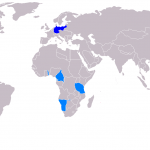
Karte deutsch Kolonien
Am 15. November jährt sich der Beginn der sogenannten Kongo-Konferenz zum 136. Mal. Wir möchten daran erinnern, denn diese Konferenz legte den Grundstein für die Aufteilung Afrikas in Kolonien. Die Konferenz fand auf Einladung von Otto von Bismarck vom 15. November 1884 bis 26. Februar 1885 in Berlin statt. Deutschland etablierte sich als Kolonialmacht in Teilen des heutigen Namibia, Togo, Kamerun, Kenia, Tansania, Burundi und Ruanda.
koloniale Anmaßung der Aufteilung Afrikas wirkt bis heute in vielerlei Hinsicht fort. Studien belegen, dass Regionen, die auf diese Weise zerrissen wurden, bis heute wesentlich stärker unter Bürgerkriegen zu leiden haben und häufig ärmer sind, als andere. [1]
Zur (moralischen) Rechtfertigung der kolonialen Gewalt wurde die „Rassentheorie“ entwickelt und der Kolonialrassimus tief ins Selbstverständnis der Kolonisierenden gebrannt. Auch der Kolonialrassimus wirkt bis in die Gegenwart. Für wohlhabende, weiße Schichten sind Reisen in den Globalen Süden im Rahmen von Schüler:innen-Austausch oder Freiwilligendienste üblich. In den Berichten darüber werden Menschen und Länder des Globalen Südens stereotyp und rassistisch dargestellt – sei es bewusst oder unbewusst. Manche Erzählungen lesen sich gar wie koloniale Reise-berichte. [2] Ausdruck des weißen Vorherrschaftsdenkens ist auch die erste Deutsche Kolonial-Ausstellung von 1896 im Treptower Park. Sie war auch eine „Völkerschau“, in der die Kolonialisierten in einer zoo-ähnliches Situation „ausgestellt“ wurden. Darüber informiert die Daueraustellung „zurückGESCHAUT“ gestaltet durch die Initiative Schwarze Menschen in Deutschland und berlin postkolonial e.V. [3,4]
Wir sind mit gegen (neo)koloniale Herrschaft solidarisch. Seien es erinnerungspolitische Kämpfe, wie die Reperationsforderungen die Kolonialisierung insgesamt und speziell für den Völkermord an den Herero und Nama, oder Forderungen nach Umbenennungen von Straßen und Plätzen. Seien es Umwelt- und Klimakämpfe um indigenes Land, wie bei der North Dacota Access Pipeline auf dem Gebiet der Wet’suwet’en in Kanada oder bei den Brandrodungen des Amazonas und der Pantanal Feuchtgebiete in Brasilien.
Wir sind für die Beseitigung der neokolonialen Ordnung damit der Weg geebnet ist für Aussöhnung und kollektive Verantwortungsübernahme.
PS:
Der Auslöser sich als Gruppe mit Kolonialismus intensiver auseinander zu setzen war die empfehlenswerte Doku „Entkolonisieren“:
(*) Als Verwertung wird der Verkauf von Gegenständen, bezeichnet um daraus Profit zu schlagen
Solidarity with anti-colonial struggles – for an anti-colonial culture of remembrance.

Map of German colonies
November 15th marks the 136th anniversary of the beginning of the so-called Berlin Conference, also known as the Congo Conference. We would like to remember it, because this conference laid the foundation for the division of Africa into colonies. The conference took place at the invitation of Otto von Bismarck in Berlin from November 15, 1884 to February 26, 1885. Germany established itself as a colonial power in parts of what is now Namibia, Togo, Cameroon, Kenya, Tanzania, Burundi and Rwanda.
The colonial arrogance to divide Africa continues to have an effect in many ways to this day. Studies have shown that regions that were torn apart in this way still suffer much more from civil wars and are often poorer than others. [1]
Colonial tyranny, which sought to impose dystopian production quotas for rubber, among other things, by means of whipping and mutilation, turned into capitalist exploitation in many regions. This neo-colonial exploitation takes various forms, such as discriminatory trade policies, violent and destructive mining of mineral resources for the Global North, utilization of drinking water for profit, exploitation of sewers or displacement of peasants by agribusinesses. It is also these forms of destruction of natural resources and neo-colonial exploitation that drive migration processes. The continued colonial tyranny is expressed in the fact that migrants are criminalized and left to drown.
For the (moral) justification of colonial violence, the „race theory“ was developed and colonial racism was deeply burnt into the self-image of the colonizers. Colonial racism is also effective to the present day. For wealthy, white classes, trips to the Global South are common in the context of student exchange or voluntary service. In the reports about them, people and countries of the Global South are portrayed in a stereotypical and racist way – consciously or unconsciously. Some stories even read like colonial travel reports. [2] The first German Colonial Exhibition of 1896 in Treptower Park is also an expression of white supremacy thinking. It was also a „Völkerschau,“ in which the colonized were „exhibited“ in a zoo-like situation. The permanent exhibition „zurückGESCHAUT“, organized by the Initiative Schwarze Menschen in Deutschland and berlin postkolonial e.V., informs about this. [3,4]
We are in solidarity with the resistance against (neo)colonial domination. Be it memorial struggles, such as the demands for reparations for colonization as a whole and especially for the genocide of the Herero and Nama, or demands for renaming streets and squares. Be it environmental and climate struggles for indigenous land, such as the North Dakota Access Pipeline in the Wet’suwet’en area in Canada or the slash-and-burn clearances of the Amazon and the Pantanal wetlands in Brazil.
We are for the abolition of the neocolonial order to pave the way for reconciliation and collective responsibility. Our anarchist perspective is inevitably anti-colonial, anti-religious, anti-capitalist, anti-racist.
PS:
The starting point to deal with colonialism more intensively as a group was the recommendable documentary „„:

